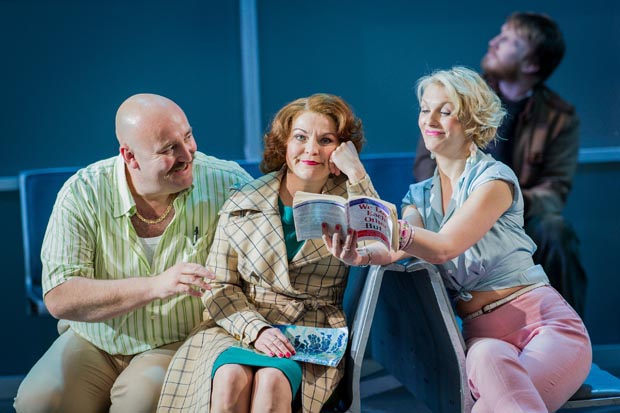We opera critics love gazing into crystal balls. We’re particularly good at discovering Ed Milibands and backing them to the hilt. Postwar opera is full of them. Take Hans Werner Henze. He was considered the future his entire life. Yet watching a presentation of two of his chamber operas at the Guildhall School of Music last week, it was hard not to think, how? Why?
To be fair Henze never intended his early radio opera Ein Landarzt (1961) to work on stage. Originally conceived as a vehicle for Dietrich Fischer-Dieskau, the piece concedes nothing to dramatic interest (even in this theatrical adaptation). An overwrought Kafka monologue — in which a doctor hallucinates for half an hour — is coolly despatched in an orchestral game of pass-the-parcel. Some kind of sweaty, middle-of-the-night pleasure might have come across in the claustrophobia of a radio broadcast but in this production, unimaginatively staged and hygienically acted and sung, it felt quite lifeless.
Accompanying this rarity was Henze’s penultimate opera Phaedra, written in 2007, a stage work with a mysterious genesis. Between composing the first act and the second, the 80-year-old Henze slipped into a coma. Everyone thought he was about to die. As the whole music world descended upon his Italian villa, he sprang back to life. Sadly the opera isn’t so fortunate. The coma of the first act never lifts. Partly this is down to a headache-inducing treatment of the Phaedra myth, which incorporates both the prequel about the Minotaur and a sequel about Hippolytus. It wasn’t helped by a pretentious staging that included bald goddesses in wedding dresses.
For many decades Henze’s niggardly modernism was the operatic model. After this drought, who can blame the critics for going doolally over the relative generosities of John Adams and his imitators. Opera Holland Park is currently offering a revival of one, Flight (1998). In it, composer Jonathan Dove combines verismo melodies and musical theatre harmonies with a libretto of easy sentiment and soapy directness. It’s fast food that thinks it’s haute cuisine.
We’re in an airport. Tina and Bill are off on their hols. A slightly tragic Older Woman pines after a 22-year-old lover. There’s a homesick Belarusian, a thin Controller, a frisky Steward and a Refugee (sad face). A melodrama worthy of Crossroads unfolds.
The singing was exceptional (particularly Jennifer France and James Laing), the staging plausible, the score fluent. So not a completely awful night out. But tell me this: is it enough for an opera not to be awful? This seems to be all we demand from new opera these days. Is there no middle way between Kafka and Crossroads? And, more pressingly, has anyone ever put on someone else’s trousers by mistake? The comedy came courtesy of the Chuckle Brothers.
The most exciting moment of the week was the première of Harrison Birtwistle’s chamber work, The Cure, at Aldeburgh. Finally here was something with a bit of guts, a bit of life. Unlike Henze’s sprawling Phaedra, Birtwistle and librettist David Harsent homed in on one specific aspect of the Medea myth, in which Jason asks his sorceress other half to resurrect his dad Aeson. Over the course of four short scenes, as mad Medea slowly magicks up her father-in-law, Harsent and Birtwistle burrow down into the fable — a classic ‘be careful what you wish for’ tale — the six instruments working out their material with the same seductive but suffocating inevitability as the story.
The companion piece, Birtwistle’s The Corridor (2009), meditating tricksily on the journey that Orpheus and Eurydice take from Hades, was far less successful. Alison Chitty’s abstract sets, however, were genius throughout: Cy Twombly scribbling in The Corridor, Ellsworth Kelly colour fields in The Cure. Elizabeth Atherton was best when maddest, scuttling across the floor like a crab as Medea. The only bum note was Mark Padmore, whose Jason looked like Alan Partridge and who came into his own only once he’d stopped singing, morphed into a wheezy, half-dead, chemo-haired Aeson and began to clamber out of his grave.
No predictions here then, but one appeal: please can Jonathan Dove not be the future of opera? It’s like facing the prospect of Jack Vettriano being the future of art.






Comments